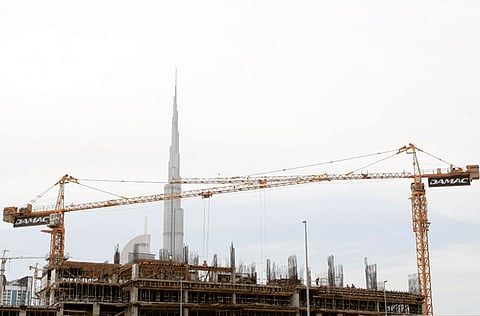Construction sector remains soft
Market becoming less attractive as impact of global financial crisis lingers

Dubai: The construction industry in the UAE is still feeling the impact of the global recession with more than $170 billion (Dh 624.36 billion) worth of projects either on hold or cancelled, a report has claimed.
"Its total project awards have fallen by $6 billion in the year-to-end August, while its cancelled & delayed projects are up 13 per cent to $170 billion," Citi notes. Meanwhile, the UAE's project pipeline has increased by 7 per cent to $175 billion, it says.
A construction project tracker by Citigroup revealed that the UAE — the region's second biggest market — accounts for 56 per cent of total project cancellations and delays across the Middle East and North Africa (Mena) region.
"Unsurprisingly cancellations in the UAE relate predominantly to real estate," the report said. "We believe this market is becoming less attractive for contractors, particularly amid reports… of payment delays now affecting Abu Dhabi and not just Dubai projects."
It also revealed that a total of $5.1 billion of new construction projects have been announced in the last 30 days, the report found, which mostly reflects the $3.3 billion in new Qatari projects in the wake of the announcement that the country will host the 2022 Fifa World Cup.
Saud Masoud, a construction analyst at Rasmala, told Gulf News that delays in the UAE were unlikely to ease and could lead to more projects being shelved. "Delays are tied to liquidity more than supply or demand," he said.
Development cycle
"[The] UAE development cycle remains weak and will struggle to find liquidity for all projects on the radar. Some may see considerable delays if not outright cancellations."
Craig Plumb, Head of Research, Mena, at Jones Lang LaSalle, pointed out that while the number of projects delayed was slightly lower, the number of cancelled projects had increased.
He said that this shift was likely the result of the Dubai Real Estate Regulatory Authority [Rera] cancelling some 200 projects earlier this year, a positive move in what is still a saturated market. "From the market's perspective the last thing we need is a whole load of new projects," he said.
But while real estate projects have been particularly badly hit across key markets in the Mena region, the oil and gas and refining sectors have buoyed, rising 6 per cent over the last month.
"We believe governments could be looking to plug potential industrial gaps, for example, gas allocation for electricity, as well as for key industrial projects is lacking in Mena. We believe governments may be looking to remedy this issue," the report stated. This is certainly the case in the UAE, Plumb said.
"There is a big shift away from real estate projects into infrastructure.
"Certainly in the UAE the major spending is going to be on infrastructure whether that's power stations, nuclear power or railway lines," he said.
Meanwhile, Iraq has overtaken Saudi Arabia as the region's largest projects market, with $16.6 billion worth of contracts awarded between January and July.
The figure exceeds Saudi Arabia's $16.4 billion.
Rise and fall
While an increase has been seen for cancelled projects (+5% to $568 billion), delayed projects are down (-2.8% to $1,128 billion).
Saudi Arabia has added $81 billion of preliminary projects to its pipeline since last July.
Kuwait has announced $1.7 billion of new projects while the UAE is adding $1.2 billion.
Power accounts for $3.4 billion of new projects, reflecting increased investment, particularly in Saudi Arabia and Egypt.
New Infrastructure amounts to $1.5 billion and predominantly reflects airport expansion projects, including $500 million in Dubai and $650 million in Kuwait.


